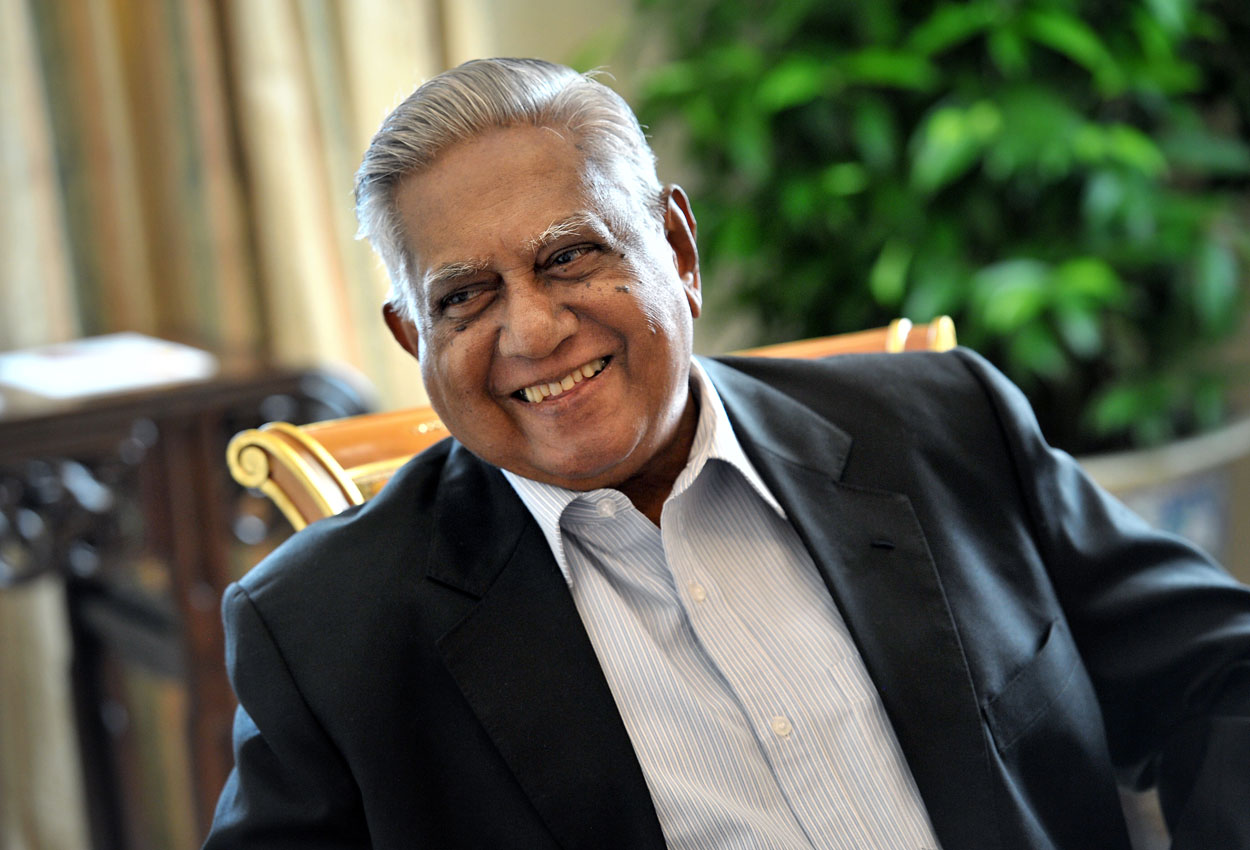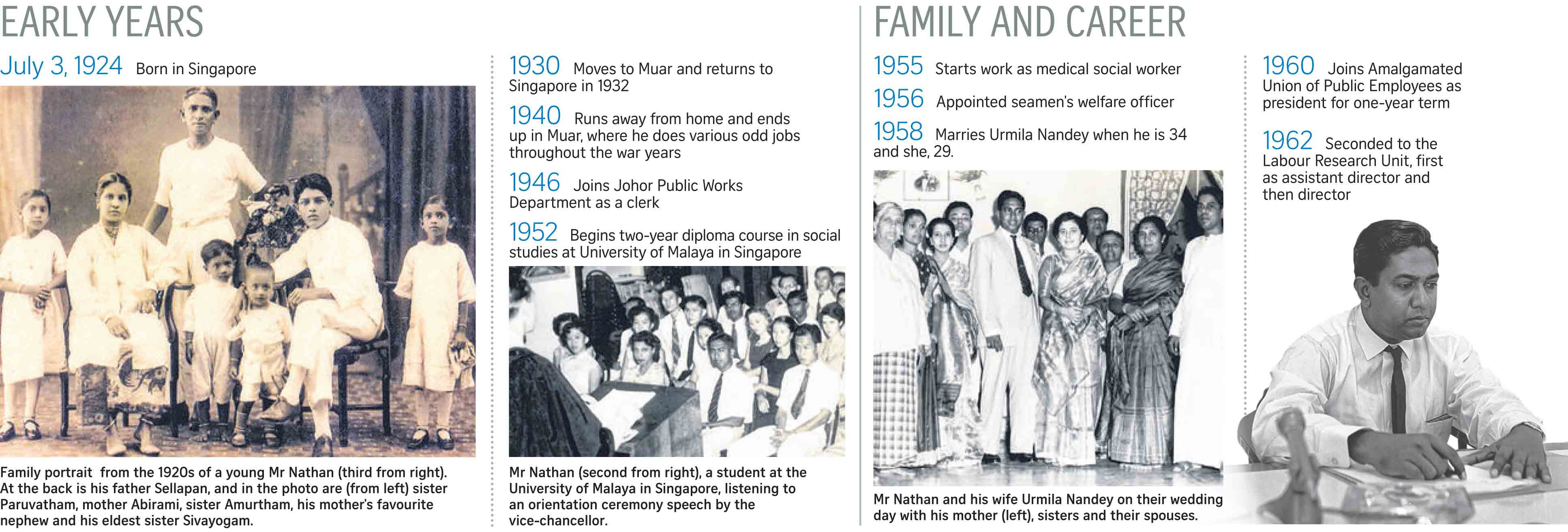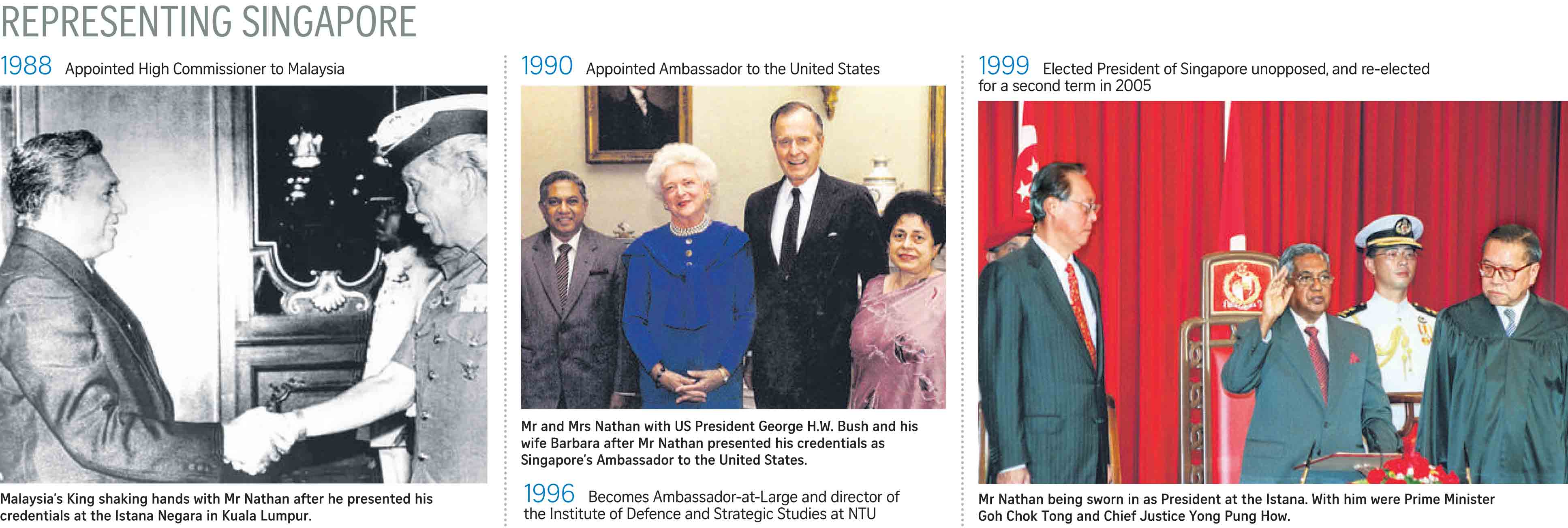SINGAPORE – Stature and fame may have defined the last decades of the life of former president S R Nathan.
But it was the grinding desperation of his early years that shaped the man.
Mr Nathan, who died Monday aged 92, led an extraordinary and “improbable” life of a teenage runaway who rose to the highest office in the land.
In his 92 years, he was, above all, a survivor – overcoming a troubled childhood and a wartime adolescence to become the safe pair of hands in which Singapore’s founding leaders placed challenge after challenge.
Whether marshalling the intelligence service, winning over a cynical newsroom or steadying volatile diplomatic relationships with Malaysia and the United States, Mr Nathan answered every call, spurred on by the simple code he said defined his life: duty.
Through it all, he remained markedly unfazed, perhaps because his early years required him to have stores of courage and grit that would make later, more public challenges appear to be less daunting.
His greatest achievements were a product of sustained pressure and patience, and came long after others would have given up: He married Urmila Nandey after a 16-year courtship, during which the objections of her higher-born family were overcome; he entered university at age 28; the President’s Office at 75.
“From the adversities of childhood and youth, I learnt never to shun the rough and tumble of life,” he said on his 80th birthday in 2004. “I learnt to look at life in the face.”
His was a life both marred by tragedy and blessed by charm.
Sellapan Ramanathan was born in 1924 in Singapore. His mother had him only after she went on a pilgrimage to Rameswaram in India’s Tamil Nadu state. His three older brothers died when they were very young.
His early years in Muar, Johor, were happy ones, but they turned on a dime. His father lost his job as a lawyer’s clerk and committed suicide when Mr Nathan was eight years old. At age 16, after being thrown out of school for a second time, and quarrelling with his mother over it, he ran away from home.
When war came to then Malaya in 1942, he was sleeping on the streets – uneducated, jobless, all alone and surrounded by wanton violence and deprivation. But the hard knocks built in him resilience and, regardless of the regime in power, he knew how to survive.
Just as he had learnt English at a young age to earn his keep, he learnt Japanese during the Occupation and soon rose to become assistant and interpreter to the head of the Japanese civilian police in Johor.
He had mentors, too, among the colonial British, who ultimately found him a job after the war in the civil service, where he would stay for 40 years.
The turning point of Mr Nathan’s professional life came in 1964, when as a government officer seconded to the National Trades Union Congress, he was given the task of travelling to Algiers and negotiating Singapore’s acceptance into the Afro-Asian People’s Solidarity Organisation.
The grouping of newly independent African and Asian nations was dominated by radical political groups that were sympathetic to communist parties in their countries. Armed with a basic brief from then Deputy Prime Minister Goh Keng Swee – delivered at the Istana while then Prime Minister Lee Kuan Yew practised his golf swing nearby – Mr Nathan outperformed expectations by succeeding against the agitations of leftist elements trying to torpedo Singapore’s membership.
He was initially jeered by some who accused him of being a neo-colonial stooge. Eventually, he won over delegates by telling jokes and buying drinks and got the grouping to consider Singapore’s application the following year.
With characteristic understatement, Mr Nathan wrote in his memoirs of the incident: “I think this may have led our leaders to see my potential.”
From then on, he grew to become what Mr Lee heralded, at Mr Nathan’s 80th birthday, as “an indispensable man for all seasons”.
“Every time there was a tricky task which required a steady hand, someone dependable and who could get things done, his name would pop up,” said Mr Lee.
In 1982, after leaving the foreign service, Mr Nathan was asked by Mr Lee to head The Straits Times Press (1975) as executive chairman at a time when relations between the Government and The Straits Times were strained.
His appointment was greeted with suspicion by journalists, who interpreted it as a move by the Government to restrict press freedom and wore black armbands in protest.
But he did not turn to administrative clean-ups, arbitrary disciplinary measures or dismissals, and instead took time to understand the concerns of journalists and newsmakers alike.
Recalling this “complex” episode years later at an interview in 2010, he said with his trademark unflappability: “I had seen bigger strikes than that! They were only wearing black armbands and jumping about. But when they saw I was not doing what they expected me to do, they began to have confidence.”
Later, at age 72, as Mr Nathan looked forward to retirement with his wife Urmila after a six-year stint as Singapore’s Ambassador to the US, Mr Lee called again.
This time, the challenge would take the boy who expected to remain a hawker’s assistant all his life, to the Istana as Singapore’s second Elected President.
Mr Nathan would stay in this role for 12 years, and while he never met an electoral contest as no candidate was found eligible to run against him in either of his two terms, he played a leading role in shaping the young and evolving institution into what it is today.
In 2009, after 11 days of deliberation, he exercised its chief function by turning the second key to the national reserves, releasing $4.9 billion to the Government to fund anti-recession measures during the global financial crisis.
Less dramatically, over the years, he moulded the office in the image of the medical social worker he started out as after his university studies.
He became a champion of the poor, needy and disabled, and turned the presidency into one of the most powerful charity fund-raising operations in the country.
Only once in his career did Mr Nathan acknowledge despair.

This article was first published on August 23, 2016.
Get a copy of The Straits Times or go to straitstimes.com for more stories.











































































































































































